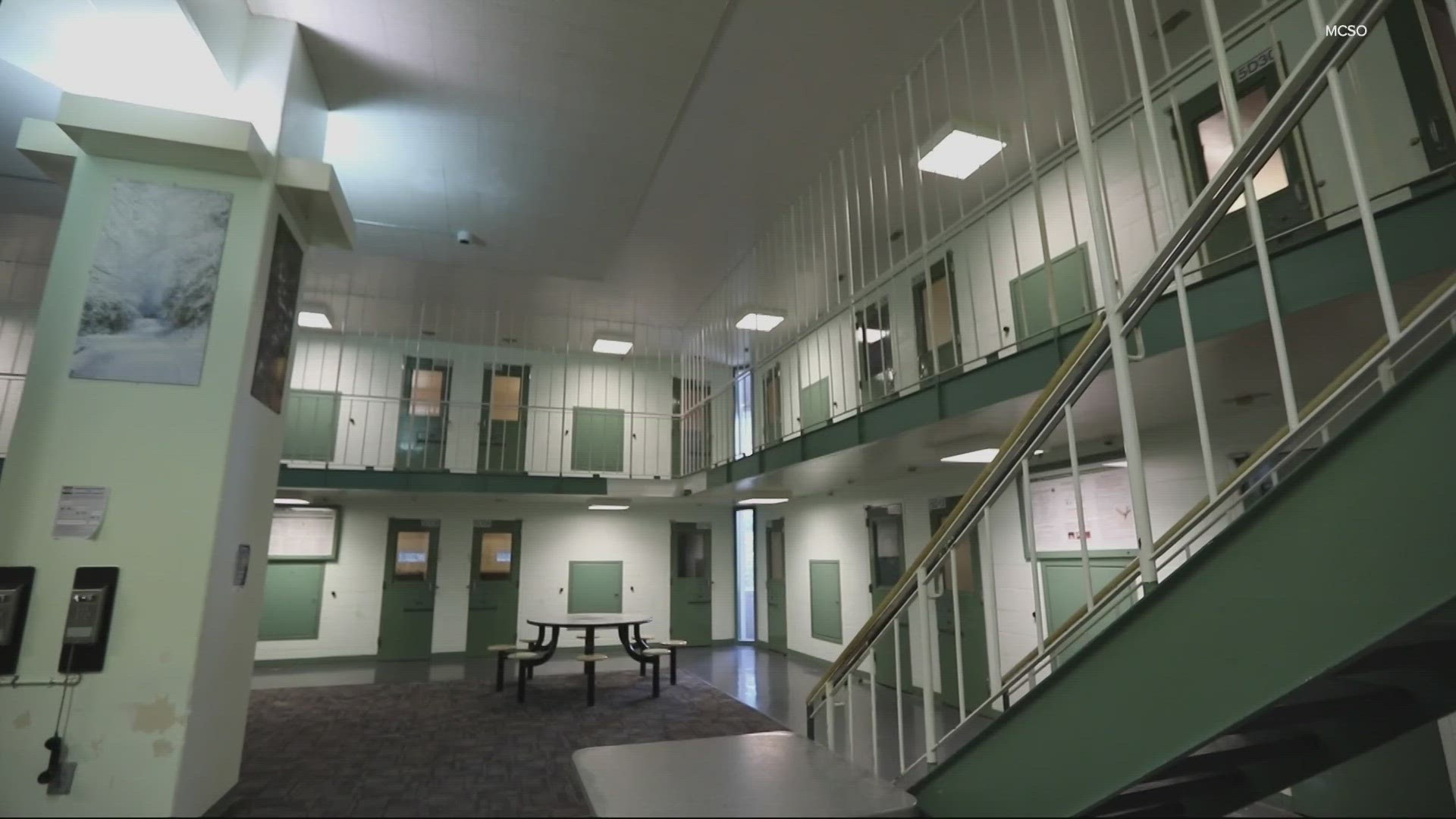PORTLAND, Ore. — The Multnomah County Sheriff's Office has been making progress on several recommendations from a 2022 audit of its jail conditions and practices, according to a follow-up report released this month, but several recommendations have been neglected, particularly those that called for reducing the use of inmate isolation as a method of discipline.
"For someone who is incarcerated, we don't want them to come out less able to interact with other people. Particularly if someone has a history of mental health conditions it is much more harmful for them to be isolated, it can deteriorate their mental health," said Multnomah County Auditor Jennifer McGuirk.
The original 2022 audit found that although discipline and use-of-force procedures appeared to be consistent with standards, Black inmates had force used against them at disproportionate rates and received a disproportionate number of misconduct citations, with some deputies issuing citations at much higher rates, according to a summary on the county's website.
"Just the fear and anxiety that I can imagine a Black person who is incarcerated must experience," McGuirk said. "They may feel targeted because of the color of their skin, and that's not acceptable. No one should have to live like that, whether they're at home or in the unfortunate situation of being in jail."
The audit also found that jail conditions were worse for inmates with mental health conditions, and the sheriff's office didn't make sufficiently consistent decisions about where inmates were housed. The audit included 13 recommendations, such as delaying classification interviews until 72 hours after booking, identifying race-related implicit bias and adding more capacity for inmates with mental health conditions.
Each recommendation was tied to a deadline between Sept. 2022 and April 2023 — in some cases, forming sequential steps. For example, the audit recommended that the jail eliminate the use of isolation as discipline for inmates with mental health conditions by Sept. 2022 and then phase it out for all inmates by March 2023.
The new follow-up report found that two of the audit's recommendations have been fully implemented and another seven are in the process of being implemented, but the sheriff's office has made no progress in implementing the other four.
McGuirk said the sheriff's office still has work to do, pointing to the alarming statistic that 10 people have died in Multnomah County jail since 2022 and three of those deaths were suicides. Staffing in the jail is on ongoing issue, she said, but the root cause of the spike in deaths is unclear.
"Clearly if you are having ten deaths in a year, you need to take a close look at what's happening in your systems and you need to make changes," she said.
In a letter responding to the update, the sheriff's office said it is "committed to a transparent process of evaluation and recommendations for maintaining industry standards and evolving best practices" and that its staff "look forward to continuing to work together on future audit projects."
Implemented or in-progress recommendations
The sheriff's office has fully implemented a recommendation to expand housing areas for inmates with mental health conditions by adding a dedicated unit with 73 beds at the Inverness Jail, according to the report, and it has also fully revised its procedures for use of force on inmates with mental health conditions.
The in-progress recommendations include delaying classification interviews for 72 hours and expanding supervisory review of classification decisions, both of which are being addressed through a new classification system that the sheriff's office is currently in the process of purchasing.
Classification refers to the process of deciding where inmates will be housed and how much interaction they will be allowed, according to the report. The goal is to screen out inmates who would be dangerous to others, but the audit's concern was that classification standards were inconsistent and risked placing some inmates under heavier restrictions than necessary.
Other in-progress recommendations include developing a training program to promote "informal solutions" to discipline issues and to monitor the use of official citations. The report said those issues are also being addressed through the new classification system, which includes discipline citations.
The final in-progress recommendations concern deputy training for how to identify and manage race-related bias and how to work with inmates with mental health conditions. The sheriff's office has hired a workplace equity and training specialist and switched to a new training contract with more material, and has also contracted with the National Alliance on Mental Illness to provide more training to all jail staff on an annual basis, according to the report.
Isolation as a discipline tactic remains an issue
The report commends the sheriff's office for making changes to discipline processes, but found that "the basic disciplinary sanctions in involving isolation and a reduction in time outside the cell remain unchanged" — meaning there has been no progress on eliminating isolation as a discipline tactic, either in general or for inmates with mental health conditions.
The audit also included a survey of inmates about their concerns and recommended that the sheriff's office implement changes in response. The report said that the sheriff's office declined, arguing that the concerns from the survey were either already addressed or outside the scope of its responsibilities.
The final recommendation was to consider an independent review process for discipline, use-of-force incidents and other jail procedures, but the report said that the sheriff's office claimed that existing reviews are sufficient, pointing to examples like the Corrections Grand Jury process and Measure 26-233, which requires inspections by county commissioners. The report argued that none of those existing reviews satisfy the recommendation.

